Keynote speakers MMA 2024
SOON....
Prof. Dr. ERHAN BUDAK
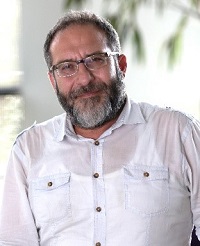
Sabanci University, Turkey
(CIRP Fellow)
Biography
Dr. Budak has been working on various aspects of machining processes and machine tools for 3 decades. After receiving B.Sc. (1987) and M.Sc. (1989) from the Middle East Technical University, he completed his Ph.D. (1994) at the University of British Columbia in Manufacturing Automation Lab. He then worked for Pratt & Whitney Canada as manufacturing development engineer until 2000 focusing on turbine engine manufacturing. Dr. Budak joined Sabanci University as a faculty member in 2000 and founded Manufacturing Research Lab (http://labs.sabanciuniv.edu/mrl/). In 2003, he was awarded the Taylor Medal by CIRP (www.cirp.net) for his work on high performance machining of turbine engine impellers and blisks. He was recipient of Mustafa Parlar “Science Award” (2018) based on his contributions to the machining research. He is the founder of a spin-off company, Maxima Manufacturing R&D, which develops and implements machining solutions for various industries. He has authored/co-authored more than 200 articles and papers in conference proceedings receiving more than 10 000 citations with h-index of 50 (Google Scholar). He is a fellow of CIRP (currently Chair of Scientific Committee on Machines), associate/regional editor and editorial board member of several journals. His areas of interest include machining processes and machine tools, intelligent manufacturing, process modelling and simulation, high precision/ performance manufacturing and machine dynamics.
Keynote title: Increased Performance and Flexibility in Machining through Process Modeling
Abstract: Machining is a commonly used manufacturing process in many industries such as automotive, aerospace, energy, die and mold, medical etc. due to its flexibility and ability to produce high quality parts. Although there have been significant advances in machine tool, control and CNC, CAD/CAM and cutting tool technologies over the last couple of decades, the productivity in these processes is still limited due to the process related problems such as excessive cutting temperatures and forces, process instability and chatter vibrations, part/tool/machine deflections etc. Current CAM systems or CNCs do not provide solutions to these problems. Process models (or digital twins), on the other hand, can be used to predict, avoid or reduce these problems through determination of the appropriate process conditions. In this talk, a brief overview of machining process modeling fundamentals such as chip formation mechanics, shearing, friction etc. will be given, and their use in calculation of process forces will be presented with examples. As one of the main and common problems in machining, cutting dynamics and stability will be explained through process-structure interactions where effects of structural dynamics and process conditions will be presented. Commonly used chatter suppression methods will be demonstrated with examples. Implementation of the models for production process simulations will be discussed, and process optimization will be demonstrated through industrial application examples. Modeling and simulation of special machining operations such as simultaneous turning/milling and turn-milling will also so be presented. The presentation will be concluded with future aspects machining process modeling and simulation.
Prof. Dr. EMANUELE CARPANZANO
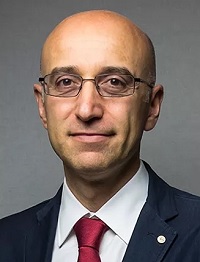
University of Applied Sciences and Arts of Southern Switzerland, Switzerland,
(CIRP Fellow)
Biography
Prof. Dr. Emanuele Carpanzano is Director of the Department of innovative technologies at the University of Applied Sciences and Arts of Southern Switzerland. He managed numerous research initiatives at international, European, national and regional level, as well as industrial research and technology transfer projects. He is active in different federal and international associations and institutions dedicated to education, research and innovation programs and initiatives in the field of industrial engineering. His research interests and activities are focused on industrial control and automation systems, as well as on the digitalization of industrial systems and value chains, including evolution of related human aspects. He is Professor of industrial plants at SUPSI and author of more than 150 scientific papers, as well as of different industrial patents, in his applied research fields.
Keynote title: Harmonizing digital transformation and human aspects in next generation production systems
Abstract: The impact of digitization on production systems is changing the relationship between humans, the technological system and the organization as a whole. Due to growing complexity of industrial processes and their digital automation systems, it is of major relevance to consider industrial workers’ safety as well as their psychophysiological health. An innovative framework to model and design cognitive-digital closed loop control solutions is discussed, so as to achieve production performance as well as workers safety and well-being in a balanced way. Industrial application cases, experienced benefits and future perspectives are addressed throughout the talk.
Prof. Dr. LUIGI MARIA GALANTUCCI
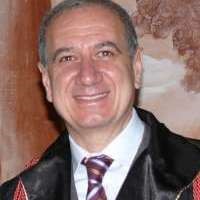
Politecnico di Bari, Italy
(CIRP Fellow)
Biography
Full Professor in Technologies and Production Systems Dept. of Mechanics, Mathematics and Management, Politecnico di Bari since 2000. Deputy Rector for the Strategic Planning, Head of several laboratories of the DMMM – Politecnico di Bari: Rapid Prototyping and Reverse, Engineering and the MICROTRONIC Micromachining and Micro-measurement. Fellow for life since 2006 of CIRP – Collège International pour L’étude Scientifique des Techniques de Production Mécanique, now International Academy for Production Engineering. “Doctor Honoris Causa” conferred by the Academic Senate of the Politechnic University of Tirana – PTU (Albania - October 16th, 2009). CEO and President of Polishape 3D srl, a spin-off company of Politecnico di Bari. Since the year 1981, he is involved in several research projects funded by the European Union, the Italian Minister of Public Education, the Italian Minister of the Scientific and Technological Research, the National Council of the Research, on: 3D scanning and measurement of micro components, Reverse Engineering, Rapid Prototyping and Additive Manufacturing, Laser Material Processing, Thermomechanical simulation of manufacturing processes (Welding, Heat Treatment, Forming), Manufacturing Processes, Computer Aided Manufacturing, Process Planning, Feature Technology, Manufacturing System Analysis and simulation, Biomechanics, Anthropometry.
Keynote title: 3D printing of parts using Metal Extrusion: an overview of Shaping Debinding and Sintering technology
Abstract: Additive Manufacturing (AM) is the fabrication of real three-dimensional objects from plastics and metals by adding material, layer by layer. One of the most common AM processes is the Material Extrusion (ME) based on different approaches: plunger, filament and screw. Material Extrusion technologies of metal-polymer composites is expanding and it mainly uses the filament or plunger based approaches. The feedstock used is a mixture of metal powder (from 55 vol% to about 80 vol%) dispersed in a thermoplastic matrix, as the Metal Injection Molding (MIM) materials. The Metal Extrusion process consists of three steps: shaping, debinding and sintering. The first step provides the extrusion of filament to realize a primary piece called “green part”; subsequent steps, debinding and sintering, allow to obtain a full metal part by dissolving the polymeric binder. The latter can be carried out using solvents, heat and the combination of them. Compared to other Metal AM process such as Selective Laser Melting or Direct Energy Deposition, the equipment used for FFF is low-priced and very easy to use. The interest, toward this technology, is driven by the low costs of the manufactured parts, the safety of feedstock materials and sustainability of the process. The aim of this keynote is to provide a general overview of the main Metal ME technologies considering the more technical aspects such as process methodologies, 3D printing strategy, process parameters, materials and possible applications for the pieces manufacturing on a 3D consumer printer.
Prof. Dr. ADAM GĄSKA
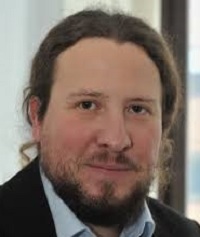
Politechnika Krakowska, Poland
(IMEKO Fellow)
Biography
Born in Krakow, Poland. He finished his studies at Cracow University of Technology in 2007 (combined Bachelor and Master studies in the field of Automatics and Robotics) and at Cracow University of Economics in 2010 (Bachelor in the field of Commodity Science). In 2011 he was awarded a PhD with distinction at Faculty of Mechanical Engineering, Cracow University of Technology and was the youngest PhD promoted in 2011 at this university. In 2018 he was awarded higher doctorate degree - DSc (habilitation) also as a youngest scientist who received this degree on that year. He works as a researcher and a teacher at Cracow University of Technology since 2010, now as an associate professor. His scientific interests include coordinate metrology, portable coordinate systems including AACMMs, LaserTrackers, triangulation and structured light scanners, topics related to measurements and systems accuracy assessment, calibration of measuring systems and material standards, numerical methods in metrology, methods for identification and correction of geometrical errors. He is an author/co-author of more than 90 research papers, from which 22 were published in JCR indexed international journals, and 3 patents. He presented his research at over a dozen international conferences. Prof. Gąska is also a reviewer in many internationally recognized scientific journals for which he performed about 150 reviews and has a status of “Outstanding Reviewer” in three of them (“Precision Engineering”, “Measurement” and “Measurement, Science & Technology”). He was the principal investigator in three research projects and a member of research group in 5 other projects, now he is the coordinator in European project and supervisor of one project for young researchers. As a member of accredited calibration lab he cooperates with many companies from different branches of industry. They include Volkswagen, Fiat Auto Poland, ALSTOM Power, ArcelorMittal, Hexagon Metrology GmbH, Carl Zeiss, Renishaw, etc.
Keynote title: Recent advances in simulation methods for determination of measurement uncertainty
Abstract: Simulation methods for measurement uncertainty estimation gain more interest and importance as they are the fastest and cheapest available solution. And the measurement speed along with low costs are ones of the most important requirement put for modern measurement and quality control systems. Recent advances in simulation methods applied to different types of measuring systems and various measuring tasks are presented in this paper. They include the latest examples from leading metrological centers and industrial laboratories, and also presentation of recent works performed in Laboratory of Coordinate Metrology at Cracow University of Technology. The virtual models of tactile and optical CMMs are presented. Considerations are also given on adaptation of virtual CMM model for industrial conditions, development of five-axis CMM model and the concept of virtual laser tracker system. Key words: uncertainty, CMM, optical measurements, industrial conditions
Prof. Dr. FRANCI PUŠAVEC
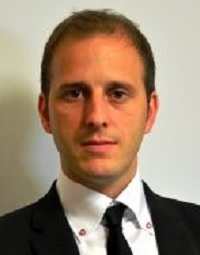
University of Ljubljana, Slovenia
(CIRP Associate Member)
Biography
Prof. dr. Franci Pušavec is a researcher at the Faculty of Mechanical Engineering, University of Ljubljana (Slovenia), leading the Department for Management of Manufacturing Technologies and Laboratory for Machining. His scientific research work in focused on the field of "Production Technologies and Systems", primarily on the field of sustainable development of cutting processes, machining and cutting machines and their upgrades, and analysis, diagnostics and optimization of cutting processes. As a result of his work he has published 62 original scientific articles, of which 2 in Group I journal (first 5%) and 46 in Group II journals (first quarter). His standardized H-index is 20, with more than 1700 pure citations by WoS and Scopus. His work is active also in high TRL activities via international patents and development of innovative solutions mainly related with cryogenic cutting processes, machine based polishing, high-pressure pulsating jet assisted machining. As a result, some of those are brought to industrialization and industrial prototypes. His scientific bibliography also includes analyzes of the machinability of various difficult-to-machine materials, the impact on the machined surface integrity, and analyzes of the dynamics of cutting processes. He completed postdoctoral training at the RWTH University of Aachen (WZL - Laboratory for Machine Tools and Production Engineering), Germany, in the period 2015-2017, for a total of 2 years. For a short time in 2007 and then in 2008 he was a guest researcher at the University of Kentucky, Lexington, KY, USA (4 + 6 months), in 2009 at the ENISE Institute, Saint Etienne, France (1 month), and in 2014 again at the University of Kentucky, USA (1 month). In the international community, he serves as a member of the International Academy for Production Engineering. Additionally, also as a member of editorial bord for three journals, as a reviewer for international scientific journals and member of scientific committees of different international conferences.
Keynote title: Green and sustainable machining processes as a basis for innovations
Abstract: The manufacturing industry is a global base for prosperity and key to Europe’s economic, social and environmental sustainability. While the main driver for development are innovations, this does not mean to be focused just on the fundamental research innovations, but also to the innovations and their evolution to the level that make contribution to the society, are on lunched to the market, etc. For this purpose the EIT (European Institute of Innovation & Technology) has been established, also in the manufacturing field – EIT Manufacturing, with the objective to unite EU production in innovation ecosystem that would give to the EU products, processes and services unique value for making more global competitive and sustainable production. This is therefore emphasizing the need for usage of fundamental research results to be progressed in development and raised to high TRL levels and lunched into the industry, market, etc. In this presentation will be thus presented the EIT innovation community, with the challenges in manufacturing and machining industry, as well as EIT activities. Additionally, the speech will be focused on the case study on supported innovation project - Transitioning to a waste-free production – international cryogenic+MQL machining activity, with the road map of clean and dry cryogenic machining, where the fundamental research is lately been pushed to the industry and market with the help of EIT platform.
Faculty of Technical Sciences
Department of Production Engineering
Trg Dositeja Obradovica 6,
21000 Novi Sad, Serbia
Copyright © 2024 FTN. Department of Production Engineering. All rights reserved.